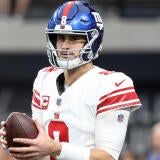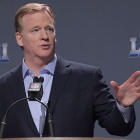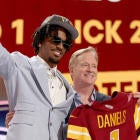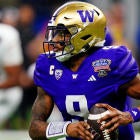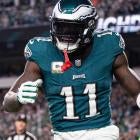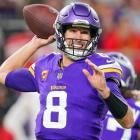ATLANTA -- Saints coach Sean Payton had a good reason for delaying his end-of-season press conference.
"I would say honestly after the game for two or three days, much like probably normal people, I didn't come out of my room, ate Jeni's ice cream and watched Netflix," he said, via ESPN.com's Mike Triplett.
NFL commissioner Roger Goodell, meanwhile, spoke publicly for the first time Wednesday, 10 days since a no-call against Rams cornerback Nickell Robey-Coleman robbed the Saints of an opportunity to represent the NFC in Super Bowl LIII, which you can stream right here on CBSSports.com or on CBS All Access.
"We understand the frustration of the fans," Goodell told the media from the Georgia World Congress Center. "We talked to Coach Payton, the team, the players. We understand the frustration that they feel right now. And we certainly want to address them.
"Whenever officiating is part of any kind of discussion post-game, it's never a good outcome for us ... but we also know that our officials are human. We also know they are officiating a game in which they often have to make snap decisions under difficult circumstances. And they're not going to get it right every time. As I say, they're human.
"We have worked very hard to bring technology in to try and make sure we can do whatever's possible to address those issues. But technology's not going to solve all those issues. The game is not officiated by robots."
So why didn't the NFL release a statement in the hours or days after the blown no-call?
"We addressed this immediately after the game," Goodell explained, continuing, "If you go back specifically on Sunday night. Coach Payton spoke to Al Riveron, our head of officials, immediately after the game. Al told him that's a play we want to have called. I have spoken to him, Troy Vincent (executive vice president of NFL football operations) has spoken to him. I've spoken to (Saints owner) Mrs. Benson. Coach has also spoken to the competition committee, so there's been a great deal of communication."
From Gladys Knight's anthem to who will score first to Maroon 5 to the Super Bowl MVP, get everything you need to make the right picks for Sunday in our Ultimate Super Bowl Props guide.
And while there had been private conversations, according to Goodell, the league hadn't spoken publicly on the matter until the commissioner took the stage on Wednesday. Now the question becomes: How can the NFL avoid this going forward?
"As far as where we can go, we will look again at instant replay," Goodell said. "There have been a variety of proposals over the last 15-20 years (that include expanding replay). It does not include judgment calls -- this was a judgment call.
"The other complication is that it was a no-call and our coaches and clubs have been very resistant; there has not been support to date about having a replay official, or somebody in New York, throw a flag when there's no flag. They haven't voted for that in the past. It doesn't mean that we won't -- it's something we're going to put to the competition committee -- to see if there's an answer to that. But the reality is that's been (opposed) philosophically by many clubs."
In the last 12 months, six referees have retired. Still, Goodell contends the the game is as healthy as it's ever been.
"We have made changes to our rules every year," he said. "We try to get better and I think that has been very effective. I think the game has never been healthier. The game has never been officiating at this level.
"And I want to say about our officials: They are men and women of high integrity. And when people are talking about officiating, they know that's not the outcome they want. I know they're disappointed also. But they work hard and I think they do an excellent job."
Who wins Patriots vs. Rams? And which side of the spread has all the value, making it a must-back? Visit SportsLine now to see which side of the spread you need to jump on, all from the computer model that has returned nearly $4,000 to $100 bettors over the past two seasons!
Hours before Goodell's press conference, ESPN's Adam Schefter reported that the NFL is expected to consider a rule that would allow coaches the ability to challenge judgment calls -- either penalties or uncalled penalties -- on a limited basis. And the rule could also include an additional penalty or time runoff if the coach incorrectly challenges a call.
One reason the rule hasn't previously been adopted is because detractors say reviews break up the flow of a game, and in the process, drag games out past the three-hour mark. But here's our counterargument: Is a game that's five minutes longer preferable to getting more calls right, especially the egregious ones that not only cost teams' wins, but in this case, a trip to the Super Bowl?
Which brings us to Bill Belichick, who on Sunday will be appearing in his third consecutive Super Bowl and his ninth since taking over the Patriots in 2000. He has long advocated that every play should be reviewable.
"When you have two challenges, I don't see anything wrong with the concept of 'you can challenge any two plays that you want,'" Belichick said in Dec. 2013, via Pro Football Talk. "I understand that judgment calls are judgment calls, but to say that an important play can't be reviewed, I don't think that's really in the spirit of trying to get everything right and making sure the most important plays are officiated properly."
That last sentence is more true now than ever. And if the league had heeded Belichick's advice five years ago, we'd be talking about a Patriots-Saints Super Bowl and Goodell wouldn't have had to spend his press conference here in Atlanta answering questions about the state of officiating that landed the league in this predicament.
"It's kind of confusing for me as to which plays are, and which plays aren't challengeable," Belichick continued. "I'm sure it's confusing to the fans to know what they all are. There are multiple pages explaining what you can and can't challenge. Then you have the officials come over to you in a controversial type of play and say, 'Well, you can challenge this, or you can't challenge it' which is helpful. But I'm just saying the whole idea of simplifying the game and trying to get the important plays right, I wouldn't have any problem if any play was open to a challenge, understanding that if it's not conclusive, then it's not conclusive and the ruling on the field would stand. That's the way it is anyway. You have to make it a lot simpler in my mind."
It's taken five years and one of the worst no-calls in NFL history, but Belichick may finally get his wish. Unfortunately, this means little to the Saints and their fans.











